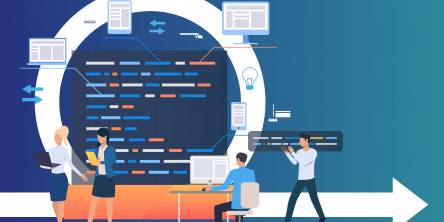Online Exams: Best Practices to Ensure Security

Online exams may seem like a modern contraption and, quite frankly, they are indeed quite advanced. But what they are not is brand new — yep, the concept of online exams has been around for nearly as long as the concept of online learning has been around. The only difference is that its popularity has started to grow only recently, largely owing to the present circumstances across the globe. But that is beside the point; what we are trying to say is that as more and more people embrace the concept of digital learning on a much deeper level, the next point of focus is bound to be online exams, because evaluation is also an essential part of the learning process.
But remember that we said that online exams have started to emerge on the scene only recently? Yeah, so that is because of the inherent distrust in the process. See evaluations have been traditionally a process that has been conducted under the direct supervision of an invigilator who can keep an eye on everyone in person and ensure fairness of the process. But how does one do that digitally? It is concerning such as these that have kept the concept from attaining mainstream status. Nonetheless, here are some tips that can deal with these concerns and allow you to put the idea to productive use.
- Secure platform: No matter if you are using a dedicated platform or administering the exam via a web browser-based app, it is critical to make sure that these means are secure. Appropriate tools and solutions can be used to make sure that candidates are not able to open any other windows while attempting the exam. Other actions such as cut, copy, paste, and more are also prevented to ensure the sanctity of the exam.
- Authenticate: It may seem redundant to say this, but the use of basic authentication methods is often ignored despite their potential to prevent cheating. So, don’t make that mistake and ensure that candidates with only valid credentials can log in to the exam portal. And top it up with the addition of a webcam to ensure only the enrolled students are logging in.
- Proctor remotely: Unlike what many people believe, it is indeed possible to proctor from a remote location. For that, make sure that the online exam software you choose comes equipped with functionalities such as image capturing, video streaming, and screen capturing to enable robust invigilation. Each of these functionalities mentioned above works in their way to facilitate proctoring; for example, with image capturing, the system can capture a picture of the candidate via the webcam at frequent intervals to identify the candidate and ensure it is them who are appearing for the exam.
- Audit logging: Audit logging is one of the most potent means to prevent cheating in online exams. Through the ways of this process, one can track all the clicks made by the student during the review. And not only that, but one can also use modern tools to monitor the students’ IP address, log in and logout timings, time is taken to finish the exam, and other such factors.
- Data encryption: The process of ensuring the security of online exams does not end as soon as the exam is over. Since the data and the reviews are stored online, there is always that risk of someone hacking into the database and altering the exam data for their benefit. To ensure that does not happen, the best thing to do is pick a solution that offers data encryption as well.
Online learning is expected to grow by leaps and bounds shortly as an increasing number of stakeholders, i.e., students, teachers, and more, accept the immeasurable value it delivers. And with it, the popularity of online exam software will rise as well. Hence, it is imperative that you get a head start on making them secure for regular use.
Similar Articles
Unless you have been hiding in a cave somewhere, you would know and realize that the world is creating information at a stunning speed. While it is genuinely considered normal information that said data can now be turned into the groundwork of achievement for essentially any business in the present day and age.
Software development refers to the procedure of constituting and nourishing software applications. This provokes the utilization of many fundamentals and practices. Software development targets constitute structured, dependable, and beneficial software.
Designing a data warehouse is a strategic activity that builds the groundwork for strong data management and analytics capabilities within a business. In today's data-driven world, the systematic creation of a data warehouse is not only a technical requirement but also a critical step in harnessing the power of information for informed decision-making.
The integration of Internet of Things (IoT) technology into the construction and real estate sectors, which include buildings, infrastructure, homes, and businesses, is predicted to increase dramatically in the future. Despite this predicted expansion, the construction industry is behind other industries in terms of IoT adoption.
In this dynamic world of innovative and transformative technology, the use of Minimum Viable Product (MVP) has proven to be a winning strategy for success.
While monolithic applications may have waned in popularity during the era dominated by the cloud and microservices, interest is resurgent. Organizations, in considering their position on the application modularity spectrum, are now examining both the advantages and drawbacks of relying on microservices.
Data visualization is an indispensable tool that allows us to transform raw, and often unstructured data into insightful visuals, identify patterns, and communicate these insights to the wider audience and stakeholders.
For modern businesses to thrive, ensuring the effective management of inventory stands has become vitally important. Inventory management stands as a cornerstone of success. And the emergence of the Internet of Things (IoT) has introduced a new era of connectivity and efficiency across diverse industries.
Do you know what the following e-commerce companies have in common: Amazon, Walmart, eBay, and more? All of these e-commerce companies' apps make use of Java. Java is decidedly among the leading choices of programming language for e-commerce applications because it offers a world of benefits; for example, since Java code can be run on any platform with a Java Virtual Machine (JVM), users of e-commerce apps made with Java can access the said apps on a variety of devices.








